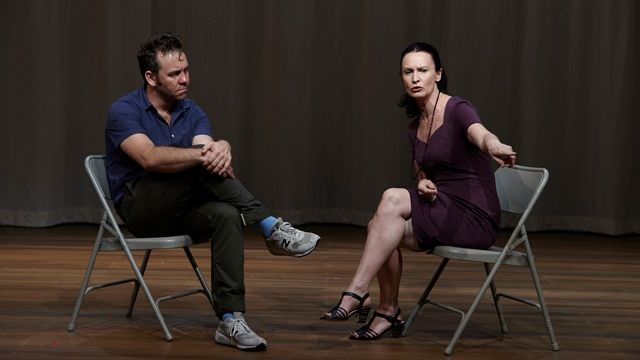Once in Royal David’s City
In this, his latest play, Michael Gow, like Julius Sumner Miller, begs us to ask, “Why is it so?” Then, like Brecht, he uses the theatre, and his protagonist Will Drummond, “to present an image of the world. That shows us the truth.” Through Will, Gow ‘maintains his rage’ about today’s society, the continuing inequalities, exploitation and oppression – and, in true political theatre tradition, uses real characters to reach past the stage and make us realise that “the war might be endless and it’s probably already lost but that’s not a reason to give up”.
This is a very moving play and, under Eamon Flack’s perceptive direction, Brendan Cowell reaches beyond the lines to find the strength, compassion, anger and intelligence of Will’s character. Cowell is a formidable presence on this stage. From the first moment, as Gow removes the fourth wall, and takes Will straight to the audience, you feel the restless energy of the character that Cowell has developed. Will is confused; he’s angry; and he wants to tell you why. But first he has to take you back, to explain.
And it is in this form of theatrical flashback that Michael Gow is at his best. He has always created believable characters, always written tight, real dialogue – always found a way to look at his message through different lenses, different perspectives. Once in Royal David’s City is no exception.
Will sets various scenes, short, pithy, to show how he has come to this moment in time, this first Christmas without his father.
 He introduces his mother, Jeannie (Helen Morse) who takes us back to a summer weekend when Will got lost at the beach. Then to a hospital where his father (Anthony Phelan) struggles after a stroke and Jeannie rages against the employer that fired him, with just a month’s wages. Morse is remarkable in this scene. She holds her handbag as tightly as the repressed anger she has maintained as she rages against indignity and loss and humiliation … “Everything’s taken off you in the end”.
He introduces his mother, Jeannie (Helen Morse) who takes us back to a summer weekend when Will got lost at the beach. Then to a hospital where his father (Anthony Phelan) struggles after a stroke and Jeannie rages against the employer that fired him, with just a month’s wages. Morse is remarkable in this scene. She holds her handbag as tightly as the repressed anger she has maintained as she rages against indignity and loss and humiliation … “Everything’s taken off you in the end”.
In another series of short scenes, Will tells us about himself. He’s a theatre director with a heart. He takes us to a rehearsal where he wants desperately to give an older actor a chance to regain her dignity and self respect. Then to a meeting with a drama teacher who wants him to speak to her private school Year 11 class about Brecht. He’s not convinced she really understands what Brecht is really about.
Then we are back in the present, at the airport in Ballina, where he’s planned a wonderful Christmas for his mother. She arrives – but is not well – and things do not go as he planned.
Through the rest of this remarkable play, where Gow has used many political theatre techniques – humour, song, direct exhortation – we are there with Will as he faces denial, anger, blame, loss and through it finds the strength to keep fighting, to believe “that there might be a speck of justice in an insane world”.
With pretty solid references to Brecht, Marxism and Christianity, Gow takes the audience and his characters on a rough journey. Will’s own family’s recent story itself is pretty tough, but, via the short, but rocky back-stories told by other characters Will meets, Gow keeps reminding us of society’s ills and the need to resist them with ‘righteous rage’.
Gail (played by Helen Buday) rages against a society that took her mother’s first child into adoption and left a gap between her and her mother that she feels she needs to fill. Buday depicts Gail’s sense of rejection and injustice with a restless need to help others, to reach out.

Wally is a religious visitor at the hospital – but his eventual message is not one that Will expects. Phelan doubles in this role with all his usual subtlety, finding sincerity and pathos that does not prepare us for the bathos that follows.
Tara Morice slips with her usual focused flair from speech therapist, to altruistic drama teacher, to German tourist. Harry Greenwood is very funny as her German boyfriend and appealingly convincing as a boy from a broken home fleeing a particularly unhappy Christmas day.
Maggie Dence (how lovely to see her again!) doubles as the ageing actress and Jeannie’s lifelong friend, Molly, with all the real instinct for the characters that one would expect of her wealth of experience.
Lech Mackiewicz has the unenviable role of the doctor who faces Will’s anger and disbelief. In his two short scenes he manages to portray the weariness of the Christmas roster and patience and compassion borne of having to explain a hopeless diagnosis.
Led by Morice, they all become the Christmas choristers, who harmonise verses of carols as quick scene changes occur – and keep the spirit that Will hoped for this Christmas alive.
But it is Cowell and Morse who carry Gow’s most vehement messages. Morse through some early, very poignant scenes, and later as a silent, still, persistently influential presence – and Cowell with an inner force that rises and grows until it spills over in a final, blistering but heartfelt entreaty to keep fighting for what we have.
Carol Wimmer
Images: Brendan Cowell & Tara Morice;Helen Morse & Brendan Cowell; andBrendan Cowell & Helen Buday. Photographer: Ellis Parrinder
Subscribe to our E-Newsletter, buy our latest print edition or find a Performing Arts book at Book Nook.

